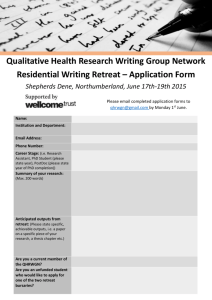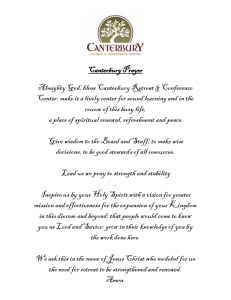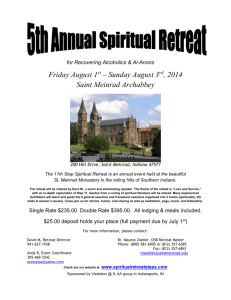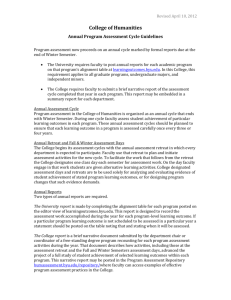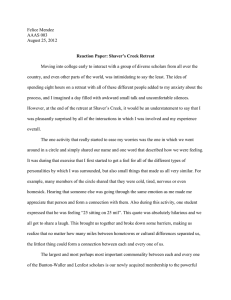Assessment Plan - SUNY College of Environmental Science and
advertisement
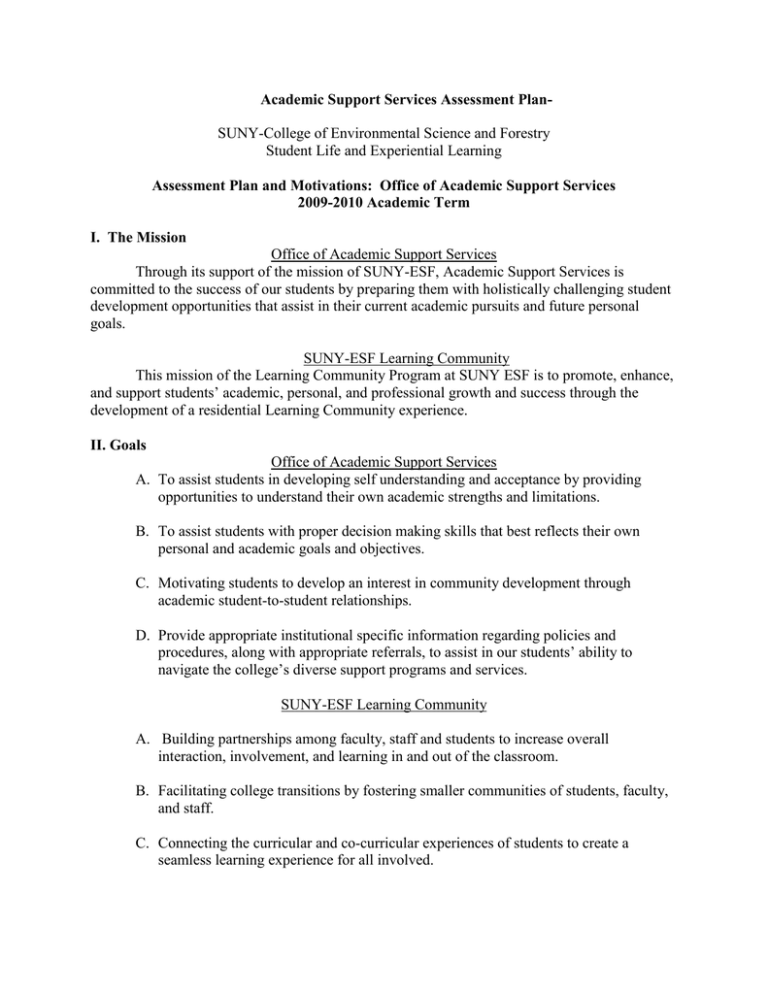
Academic Support Services Assessment PlanSUNY-College of Environmental Science and Forestry Student Life and Experiential Learning Assessment Plan and Motivations: Office of Academic Support Services 2009-2010 Academic Term I. The Mission Office of Academic Support Services Through its support of the mission of SUNY-ESF, Academic Support Services is committed to the success of our students by preparing them with holistically challenging student development opportunities that assist in their current academic pursuits and future personal goals. SUNY-ESF Learning Community This mission of the Learning Community Program at SUNY ESF is to promote, enhance, and support students’ academic, personal, and professional growth and success through the development of a residential Learning Community experience. II. Goals Office of Academic Support Services A. To assist students in developing self understanding and acceptance by providing opportunities to understand their own academic strengths and limitations. B. To assist students with proper decision making skills that best reflects their own personal and academic goals and objectives. C. Motivating students to develop an interest in community development through academic student-to-student relationships. D. Provide appropriate institutional specific information regarding policies and procedures, along with appropriate referrals, to assist in our students’ ability to navigate the college’s diverse support programs and services. SUNY-ESF Learning Community A. Building partnerships among faculty, staff and students to increase overall interaction, involvement, and learning in and out of the classroom. B. Facilitating college transitions by fostering smaller communities of students, faculty, and staff. C. Connecting the curricular and co-curricular experiences of students to create a seamless learning experience for all involved. D. Develop a sense of power and authority in their environment; they will move from buy-in of the learning community to a sense of ownership. E. Promoting opportunities for individual students to make more meaningful connections with members of the SUNY-ESF community. F. Supporting students’ successful completion of their academic programs. G. A continuous contribution of enrichment to the institution’s intellectual climate. H. Fostering students’ active commitment to the college community as students. III. Motivation for Assessment The umbrella of Academic Support Services and its vast array of programs such as its Tutoring Program, the Academic Success Center, and the SUNY-ESF First Year Learning Community, is committed towards appropriate measurement and analysis of assessment data. Such a commitment is made to best understand the effectiveness of its programs, possible areas for improvement, achievement of Academic Support Services goals and mission, and also understanding the need areas that have yet to be addressed through our initiatives. By receiving such quantitative and anecdotal information via the strategies mentioned below, the program can measure the effectiveness of our efforts towards student development while also following the mission and vision of Student Life and Experiential Learning and the institution of SUNY-ESF by using the following assessment strategies: Target Assessment – focus on one initiative during the academic term, using a variety of assessment methods, to provide meaningful data as to the success, challenges, and future direction of the initiative. General Assessment – routine assessment of traditional programs provided by the Office of Academic Support Services. Data will be compiled and evaluated for implementation by using two distinct assessment methods: Solo Evaluation by the Coordinator for Academic Support Services and Collaborative Evaluation by such groups as Tutors, Tutees, the Learning Community Management team, Academic Support Services staff and the Student Life and Experiential Learning staff. The evaluation of such assessment material and determination of appropriate action is determined with dialogue using the feedback of the groups listed above and takes place either on a semester or annual basis. Such timetables are communicated specifically below for each individual assessment strategy. Throughout this initiative, it is essential to remember that this is an assessment of the program, and not an evaluation of the performance of individual faculty, program staff, or students that are associated with such Academic Support Services programs. This assessment is designed to better understand our programs, their purpose, and to determine how well the program is working to fulfill its potential. The reporting of such data is compiled and referred, after appropriate analysis by the Coordinator for Academic Support Services, to the Dean of Student Life and Experiential Learning. IV. Academic Support Services – Targeted Assessment Plan For the 2009-10 Academic Year, the Office of Academic Support Services will target the First Year Learning Community Retreat via a variety of assessment strategies to measure the effectiveness of this annual program and provide recommendations for improvement. ESF Learning Community Retreat Survey – this evaluation will be conducted at the end of the LC Retreat rotations at the end of September. The survey will be distributed to our freshmen residents residing in the Sky Halls by our ESF LC Resident Advisors. The survey will focus on the following areas of the LC Retreat: high ropes course activity, low ropes course activity, GPS course activity, feedback regarding the overall day’s activities, Orenda staff performance, and interactions with ESF faculty, staff and fellow students. o Results of the survey will be provided in the End of the Year LC Report and results will be shared with the LC Management Team to determine appropriate recommendations for changes to future LC Retreat Agenda. ESF Learning Community Fall Survey – this evaluation will be conducted at the end of the Fall semester (end of November). The purpose of this survey will be to measure the impact the LC Retreat has had on our freshmen now that the first semester has concluded while also gathering recommendations on how to positively improve the GPS event during the LC Retreat. The survey will also examine the following LC topics: overall feedback of the LC and its impact on the student’s academic success, feedback about our 3 linked LC courses (Biology, Writing, and Chemistry), Mentor feedback, and suggestions on the first annual ESF LC Newsletter. o Results of this survey will be shared with the LC Management Team and the outcome of these conversations will be provided in the End of the Year LC Report. V. Academic Support Services – General Assessment Plan Tutoring Services and the Academic Success Center (ASC) Evaluation of ESF Tutoring Services Survey – this method is conducted at the end of every semester during the months of November and April. It is a survey that is distributed to our tutors to measure the effectiveness of the Tutoring Program during the just concluded semester. The survey also includes opportunities to share feedback regarding the following areas: tutor training workshops from the previous semester, future workshop suggestions, usage of the Academic Success Center (ASC), ASC space recommendations, and general suggestions for improvement. Individual/Small Group and Large Group Evaluation of ESF Tutoring Services Survey – this survey is conducted at the end of the Fall and Spring semester during the months of November and April. This survey is distributed to our tutee population and helps to measure the effectiveness of the tutees’ respective tutor, the overall program, the benefits or drawbacks of this program towards their respective class they received tutoring in, their personal usage of the Academic Success Center, and an opportunity for general comments and suggestions. Learning Community End of the Year Evaluation – this survey is distributed during April and asks a variety of questions to our ESF LC freshmen population living on-campus. For the purpose of the ASC, a question is asked of the students regarding their usage of the ASC space and what recommendations they have for improving the services provided by the ASC. SUNY – ESF Learning Community GPA, Retention, and Persistence Data – The GPA, retention, and persistence data that is available at the conclusion of each academic year for our Learning Community student population is very valuable. Since all freshmen students, except commuters, are a part of the learning community, there isn’t a sufficient population (control group) to compare and contrast that academic standing of our students. This process is currently being explored through the SUNY-ESF Retention Committee with the hopes of having a useful set of data in the near future. Learning Community End of the Year Survey – This assessment tool will be conducted at the end of the Spring semester to evaluate the overall effectiveness of the learning community’s programs, retreat experience, and academic experience within our three linked courses (Writing, Biology, and Chemistry). The results of such data will be shared with the LC Management team to determine appropriate steps for future improvement of LC programming. o The results will be available at the conclusion of the Spring semester in the Learning Community report, included in the Academic Support Services End of the Year report. Focus Groups (HED 611) - The Syracuse University Higher Education graduate students enrolled in the HED 611: Lab in Learning Communities course will provide qualitative data regarding student satisfaction. These data will help uncover student satisfaction topics and provide information and suggestions for future plans for the learning communities currently in Flint and Sadler Halls. In addition, a program evaluation will be used at the end of the spring semester to assess students’ experiences relative to the multiple functions of the learning community. Additional Assessment as Available (i.e. NSSE, NLLP, etc.) - It is often the case that ESF is invited to participate in a variety of assessment programs. While we cannot control or determine what opportunities will be available to us, we will make every effort to participate when given the chance. This part of our assessment will remain ongoing and informal in nature unless a more consistent opportunity comes about. 2009-10 Targeted Assessment: LC Retreat I. LC Retreat Fall Survey SUNY ESF First Year Learning Community Fall 2009 LC Retreat Survey n= 141 freshmen students (51% response rate) - Sky Hall residents 1. How would you rate the Orenda Springs Experiential Learning Center and its staff? 141 Sky Halls 4.26 TOTAL [1-Poor] 0.00% 0 [2] 0.70% 1 [3-Average] 13.48% 19 [4] 44.68% 63 [5-Exceptional] 41.13% 58 2. The LC Retreat had students participate by rotating between three activities (high Ropes, Low Ropes, and GPS/Mapping Event) Please rank each activity below. Total Responses = Average = High Ropes Course: Total Responses = Average = [1-Poor] [2] [3-Average] [4] [5-Exceptional] 141 Sky Halls 4.66 TOTAL 0.00% 0 0.00% 0 7.09% 10 19.15% 27 73.76% 104 Low Ropes Course: Total Responses = Average = [1-Poor] [2] [3-Average] [4] [5-Exceptional] 141 Sky Halls 3.91 TOTAL 2.84% 4 9.93% 14 11.35% 16 44.68% 63 31.21% 44 GPS/Mapping Event: Total Responses = Average = [1-Poor] [2] [3-Average] [4] [5-Exceptional] 141 Sky Halls 2.89 TOTAL 16.31% 23 17.02% 24 38.30% 54 18.44% 26 9.93% 14 3. What feedback would you provide for the High Ropes Course activity? Fun Need more time Awesome Exciting Need more explanation of how to do activity. 4. What feedback would you provide for the Low Ropes Course Activity? Fun, a really good time. Learned a lot about my peers Teamwork was good, trust. Really liked Squirrel activity More Time Belayers should pay more attention, not talk down to groups. 5. What feedback would you provide for the GPS/Mapping Event activity? Confusing Fun, good to explore Okay Boring/Not fun Not challenging Need more mapping locations. Too rushed. Got Lost Nice to interact with faculty GPS didn’t’ work Don’t do this next year 6. How would you rank the interaction you had with the various ESF Faculty/Staff members that were stationed during the GPS/Mapping Event? Total Responses = Average = [1-Poor] [2] [3-Average] [4] [5-Exceptional] 141 Sky Halls 3.77 TOTAL 2.13% 3 3.55% 5 25.53% 36 53.19% 75 15.60% 22 7. Who did you enjoy interacting the most with during the GPS/Mapping Event? Total Responses = 73 Dr. McGee (13) Dr. Donaghy (14) Leah Flynn (11) OL’s (8) Dr. Murphy (7) Dr. Fierke (6) Other Students (5) Dean Sedgwick (4) Janine (3) Professor at the Deep Forest (2) 8. Did you utilize Goldstein Dining Hall for breakfast on the morning of your retreat? Total Responses Yes No Wasn’t aware it was open 141 80 55 6 Total Percent 56.77% 39.00% 4.26% 9. Overall, how would you rate your LC Freshmen Retreat Experience? Total Responses = Average = [1-Poor] [2] [3-Average] [4] [5-Exceptional] 141 Sky Halls 4.22 TOTAL 0% 0 4.26% 6 9.22% 13 46.81% 66 39.72% 56 II. From Fall 2009 End of Semester survey: 1. Looking back at the past semester, how would you rate the effectiveness of the LC Retreat in enhancing you acclamation with the campus, faculty and staff? Total Responses = 157 Average = 3.73 [1-Poor] [2] [3-Average] [4] [5-Exceptional] No response 7 4.46% 6 3.82% 44 28.03% 65 41.40% 35 22.29% 3 III. From Spring 2010 End of Semester survey: 5. Looking back to this past September, did the Freshman LC Retreat help in your transition to college as a freshmen student at ESF? Total Responses = 147 Percentage Yes 106 72.1% No 41 27.9% 6. How did the LC Retreat help you in your transition (referring to question #5)? (Top 3 responses) Made it easy to meet people and make friends Increased our comfort level in approaching faculty/staff It was a confidence builder IV. Conclusions/Actions: After the September 2008 LC retreat, our LC Management Team had some concerns about whether or not the faculty/staff event during the retreat was really serving its purpose. During the retreat, our students participate in three activities during the day: high ropes course, low ropes course, and then a faculty/staff activity to help connect our freshmen to our campus community. The September 2008 and 2009 faculty/staff event consisted of a GPS Mapping activity that had our students split up into smaller groups of about 8 students that would travel the grounds using a GPS to get them to particular locations on the grounds. The locations they traveled led them different members of the ESF faculty and staff family, which allowed our students the valuable opportunity to spend time with their respective professors and staff outside of the classroom setting. - Our targeted assessment found that our students enjoyed the retreat overall, ranking the retreat with an average 4.22 rating (with ‘5’ being the highest) during our LC Retreat survey given at the end of September 2009. - We also found out that 72% of the students polled during our Spring 2010 LC Survey believe the LC Retreat helped them in their transition from high school to ESF due to: the ease of being able to meet people and make friends, increased comfort level in approaching faculty/staff and overall building of confidence. - Our LC Retreat survey also showed that our students rated the high and low ropes activities during the retreat very high; a 4.66 and 3.91 rating respectively (with ‘5’ being the highest). - Lastly, and ultimately hitting home the purpose of our targeted assessment, our students during the LC Retreat survey only ranked the faculty/staff event with a 2.89 rating (with ‘5’ being the highest) mostly because the activity was too boring. We did learn though that our students did rank the interactions they had with faculty/staff during the event at a 3.77 rating (with ‘5’ being the highest). In conclusion, our target assessment showed our LC Management Team that our students truly value the LC Retreat experience and enjoy the vast majority of the activities they partake in. The one event we had concerns about, the faculty/staff event, provided results that proved our concerns were real. To remedy the situation, our team has decided to remold this particular activity during our next retreat in September 2010. Instead of having our students trek through the forest to meet our faculty/staff via a GPS course, we will include guided tours of the grounds, lawn game activities, and session to discuss the ESF summer book read all in the hopes of enhancing the student experience while also assisting our faculty/staff recruitment efforts by providing activities that the ESF campus community will be happy and willing to participate in. We will plan to re-examine this area via targeted assessment during the 2011-12 academic year.
